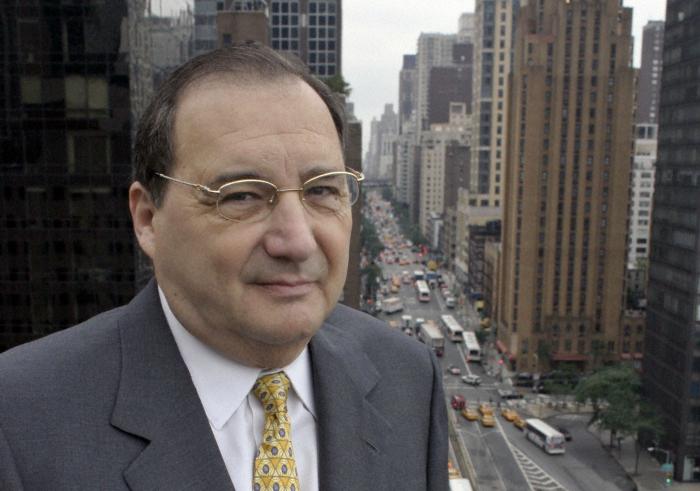- Home
- Play & Learn Home
- Online Enrichment
- Experience Modern Israel
- Israel It's Complicated
- Jewish and Me
- Jewish Holidays Jewish Values
- Jewish Values in Genesis and Jewish Values in Exodus
- Min Ha’aretz
- Our Place in the Universe
- Simply Seder
- The Prophets: Speaking Out for Justice
- Making T'filah Meaningful
- Make, Create, Celebrate
- Yom Haatzmaut Resources
- Hebrew Apps
- About The OLC
- What is the OLC?
- Introduction
- Get Started
- Resources
- OLC Content
- Parent Materials
- See My OLC Classes
- Store
Abraham Foxman: Redeeming the World from Hate
"You shall not hate your fellow in your heart."
Vayikra 19:17
Actor Mel Gibson may have battled foes in Braveheart and Lethal Weapon, but that didn't prepare him for combat with Anti-Defamation League (ADL) National Director Abraham H. Foxman. When the Hollywood star uttered antisemitic slurs last July, Foxman swiftly responded, declaring, "At a time of escalating tensions in the world, the entertainment industry cannot idly stand by and allow Mel Gibson to get away with such tragically inflammatory statements." As a result, Gibson offered an apology to the Jewish community.
Foxman has fought antisemitism, prejudice, and bigotry throughout his nearly 40-year career at ADL, and he personally knows hate's devastating effects: When his parents were sent to the Vilna Ghetto in 1941, Foxman, age 1, was rescued from the Holocaust by his Polish nanny. She raised him as a Catholic and hoped to keep him, even when Foxman's parents returned four years later. After winning a lengthy custody battle, his parents reintroduced him to Judaism, and the family immigrated to the United States.
"I am lucky to be able to spend my life dealing with issues that were so important when I was a child," notes Foxman. "I have a chance to fight antisemitism, an evil that almost destroyed me."
BABA: Hi, Mr. Foxman. As a child, your nanny raised you as a Catholic, and your parents reintroduced you to Judaism. How did you make the transition?
FOXMAN: I was raised by my nanny to be a person of faith. I believed in God, I went to church, and I prayed in Latin. My father taught me that I could exchange one belief for another: He showed me how to pray in Hebrew. He removed my crucifix and replaced it with a Magen David. He exchanged my cross for a tallit katan. At the beginning, we went to church and synagogue, and eventually only to synagogue. My parents had the patience and wisdom to understand that I was a child, that I could only grasp so much, and that I needed a comfort level, which they provided me.
BABA: Redemption can be understood as freeing ourselves from attitudes that enslave us. How does your work at ADL accomplish that?
FOXMAN: We're not born with hatred, prejudice, and bias-we learn them from others, and they can enslave us to a life of unhealthy relationships. But in order to unlearn these negative attitudes, we must first recognize when a problem of bias or bigotry exists. Likewise, to experience redemption, we must first recognize that we may be enslaved. Once we're aware of prejudice, then we're on our way to geulah, because we can break those shackles and strengthen our respect for others.
BABA: You've experienced a lot of redemptions: your rescue from the Holocaust, your return to Judaism, and your work with ADL. Do you do anything special at your Seder to recall these experiences?
FOXMAN: We recite a special prayer remembering the Warsaw Ghetto uprising, and when it was needed, we added prayers for Soviet Jewry and Ethiopian Jewry. In the spirit of reliving the Exodus in every generation, we talk about Jewish people who are not safe and secure today. That's part of retelling the story: It's not only history-it's today.
BABA: There are many people who believe that antisemitism is not a serious issue in the United States. What do you think?
FOXMAN: I wish they were right, and I hope someday they will be. Antisemitism is not as virulent here as it is in Europe, and it's not as ugly as it is in the Middle East, but it's here.
BABA: How can kids fight antisemitism?
FOXMAN: The first step is to recognize that hatred is out there, not only directed at us, but at others too. Whenever kids hear someone say something unkind about somebody else, they should stand up and put a stop to it. Unkind words affect and reinforce bigotry, and eventually antisemitism.
BABA: Thanks, Mr. Foxman, and hag kasher v'sameah!
0


